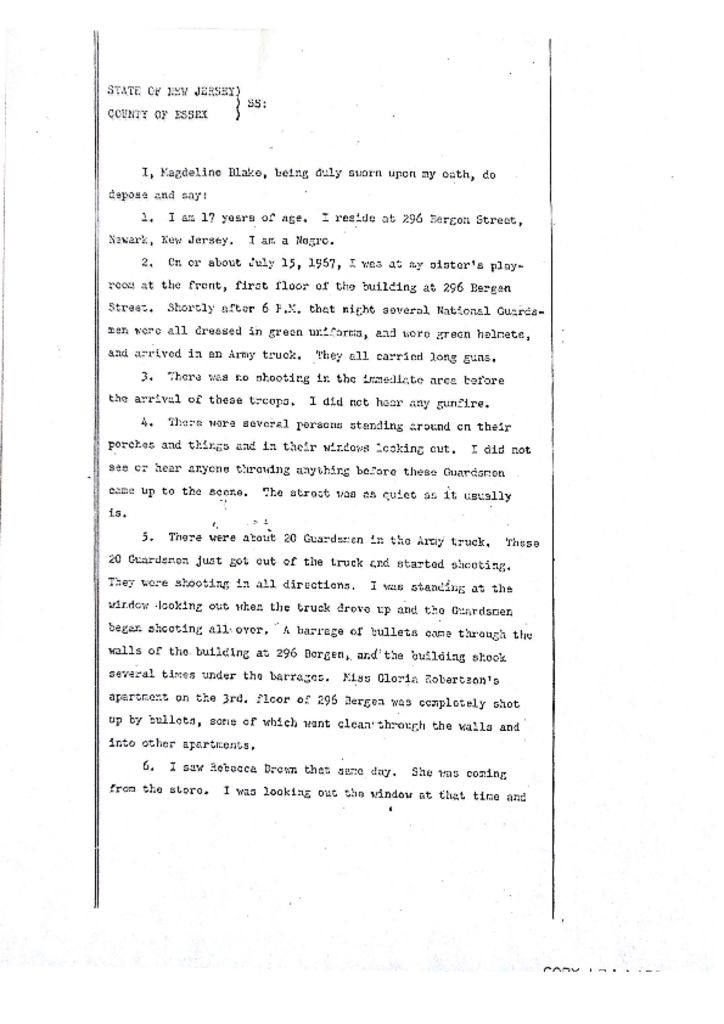Rebecca Brown
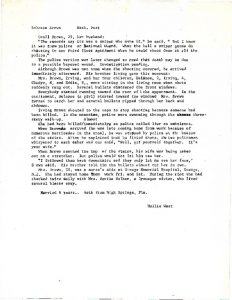
Rebecca and Ozell Brown moved from High Springs, Florida to Newark in 1961—the same year they were married. Mrs. Brown, a nurse’s aide at Orange Memorial Hospital, and Mr. Brown, a construction worker for Francisco Construction Company in Cedar Grove, lived in a third floor apartment in the Hayes Homes project with their four children, two-year-old Della, four-year-old Irving, eight-year-old Gladys, and nine-year-old Eddie Gene.
On Saturday July 15th, Mrs. Brown stayed home from work for the second straight day to look after her the safety of her children during the rebellion taking place in the city. While Mrs. Brown was at home with her youngest children that day, Ozell as at work in Cedar Grove, and the older children were out of the apartment. Mr. Brown’s brother, Irving, was visiting the family at their apartment.
At “approximately 6:00 P.M., on July 15, 1967,” Irving Brown recalled, “my nephews returned to their house…and stated that they had been told by the police that everyone must get off the streets as the police were going to come down the street at approximately 6:00 P.M. and were going to be shooting in the street.”
Just after the Brown children relayed that message to their uncle, National Guardsmen arrived on Bergen Street outside of the Hayes Homes building where the Brown’s lived. According to witness Magdeline Blake, “I did not see or hear anyone throwing anything before these Guardsmen came up to the scene. The street was as quiet as it usually is.”
According to the presentment of the Eighth Essex County Grand Jury of 1967, “State Police and National Guardsmen…had responded to the area because of reported sniper fire…” Although “sniper fire” was widely reported by police and National Guardsmen, very little evidence was found to support the 258 reports of “sniper incidents” claimed by city and state police. Furthermore, reporting “sniper fire” was used as a justification for the indiscriminate shooting of innocent civilians, as in the cases of Rebecca Brown, Hattie Gainer, and Eloise Spellman, who were all killed in their Hayes Homes apartments within minutes of each other.
“There were about 20 Guardsmen in the Army truck,” Ms. Blake continued. “These 20 Guardsmen just got out of the truck and started shooting. They were shooting in all directions…A barrage of bullets came through the walls of the building at 296 Bergen, and the building shook several times under the barrages.”
According to Irving Brown, “I observed my sister-in-law, Rebecca Brown, approach the window and grab her child, Della Brown, age 2, and turn to retreat from the window. As Mrs. Rebecca Brown turned from the window she was struck either in the back or the side from rifle fire which had come through the window…she immediately fell to the floor. She was dead before the ambulance arrived approximately 30 minutes later.”
While the Guardsmen fired upon the building for 15-20 minutes, Ozell Brown was trying to make his way back from work to his family inside their Hayes Homes apartment. After “ducking into doorways along Bergen Street” and hiding out in a neighboring apartment to escape the barrage of gunfire, Ozell Brown finally made it to the door of the building he lived in.
Upon making it to the door, ‘They wouldn’t let me see her upstairs,’ Brown said. ‘They wouldn’t let me go up. I knew she was dead when they carried her down…Right after they took her away I went to the hospital and they even shot at my car. I had three tires but I didn’t dare stop, I kept right on all the way to the hospital on three tires.’
Rebecca Brown, mother of four, was dead at the age of 29 after being shot as tried to protect her 2-year-old child from National Guard and State Police gunfire coming through the window of her apartment. The death of his wife took a significant toll on Ozell Brown. ‘I was such a confused person, you can get so messed up so bad in the head,’ Brown later said. ‘I still don’t understand it, I never will.’
The Essex County Grand Jury found “no cause for indictment” of the National Guardsmen or State Police involved.
References:
Ronald Porambo, No Cause for Indictment: An Autopsy of Newark
Witness Testimony of Ozell Brown, Irving Brown, and Magdeline Blake before the Essex County Grand Jury
Notes of Washington Post Reporter Hollie West
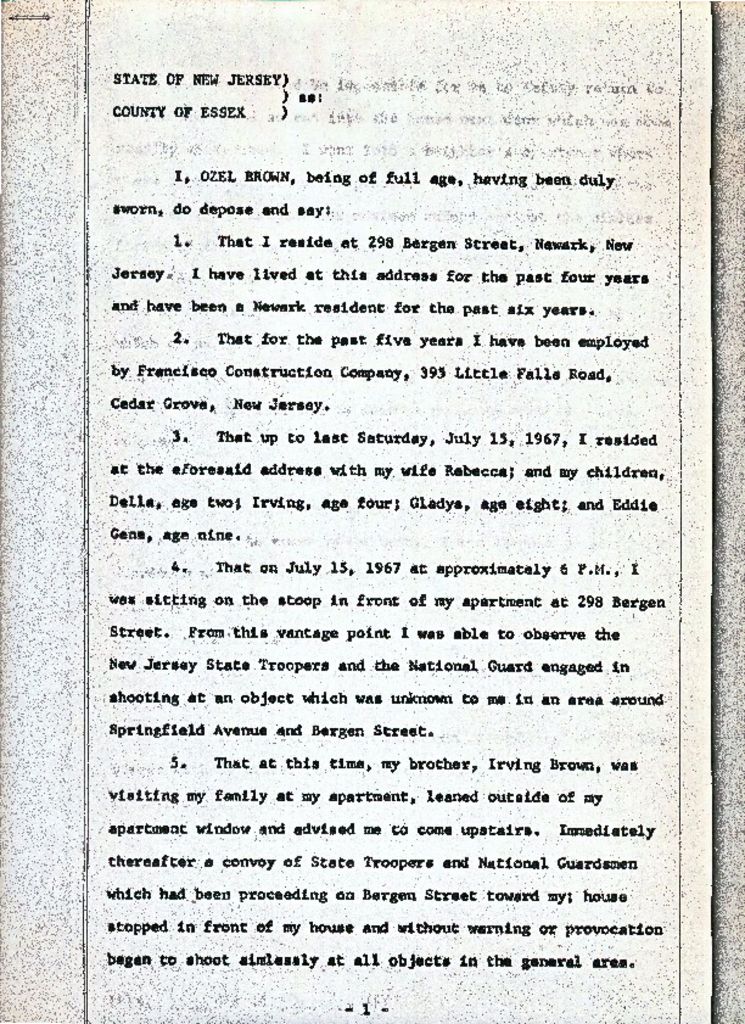
Deposition of Ozel Brown, in which he describes State Troopers and National Guardsmen firing at 298 Bergen Street. — Credit: Junius Williams Collection
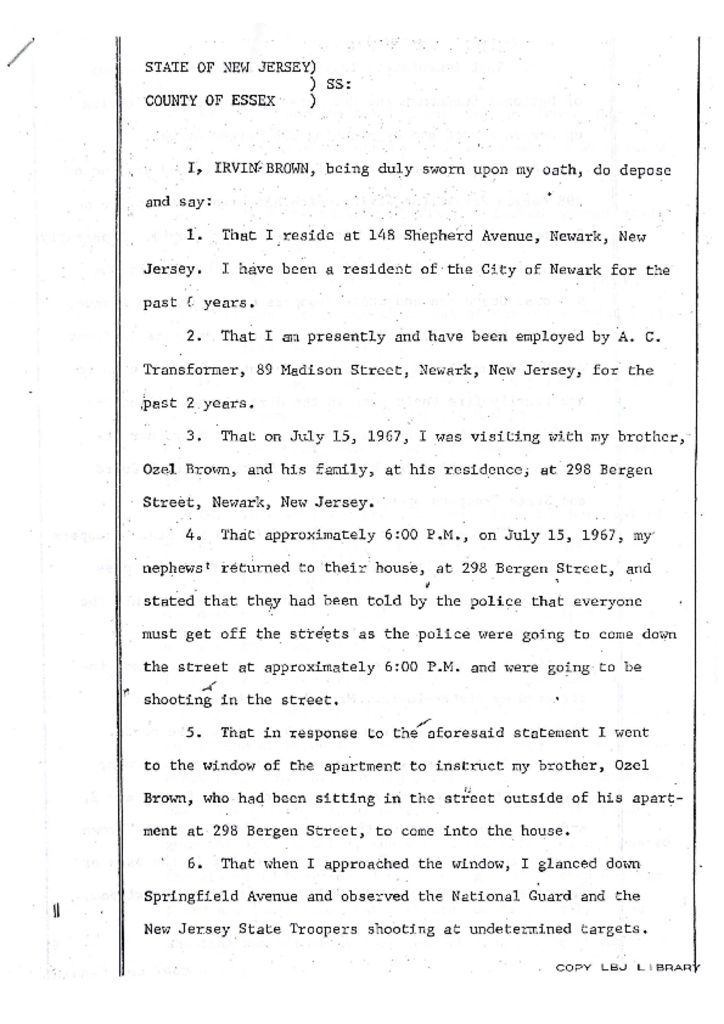
Deposition of Irving Brown , in which he describes the fatal shooting of his sister-in-law, Rebecca Brown. — Credit: Newark Public Library
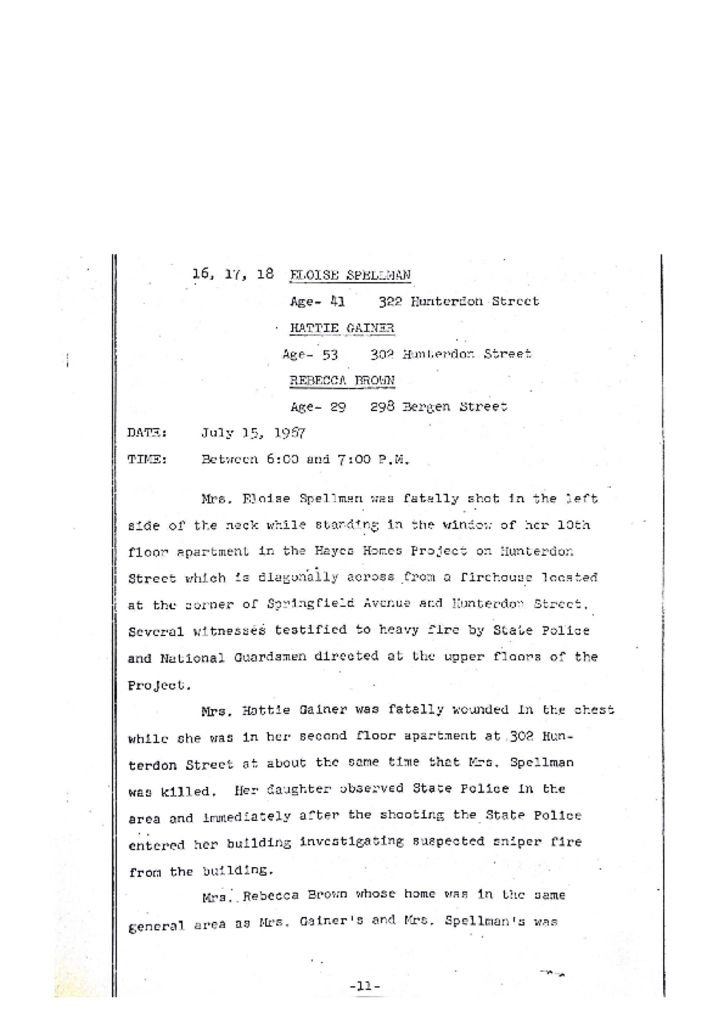
Grand Jury report describing the fatal shooting of 29-year-old Rebecca Brown on July 15, 1967. The Grand Jury found “no cause for indictment.” — Credit: Newark Public Library
